- Home
- Aaron Allston
Rebel Stand: Enemy Lines II Page 11
Rebel Stand: Enemy Lines II Read online
Page 11
Addath felt her smile grow bitter. “So you and your husband sold your services to the admiral for, what was it, two squadrons and a light carrier?”
A frown creased Leia’s brow. “No. We were going to help her from the moment we arrived. The only thing she promised us was some antiquated sea navy equipment, decomissioned vessels.”
“Then what—”
“Oh, the squadrons were what General Antilles promised Han if he’d come back now and accept a military commission. Han had a holocomm conversation with Wedge while he was running errands this afternoon. The whole conversation is recorded. I can let you watch it.”
Addath nodded glumly. “I see.”
“But I now suspect that Han will decline the commission. He likes being a civilian. A scoundrel.”
“Of course. Quite an extensive setup.” Wearily, Addath turned away. “I’ll be leaving. Perhaps the former Presider would like some additional company.”
“There’s a guest at the front gates of the residence. A member of Fasald’s staff. She’ll be accompanying you until you board your ship offworld. Helping you keep track of details.”
“I appreciate your thoroughness, Leia. You think of everything.”
Left alone on the porch, Leia watched Addath walk away and took stock of her feelings.
She almost felt bad for Addath. Watching a person’s whole store of hopes and dreams go up in flames wasn’t pleasant.
But Addath was no fool. She could analyze the Yuuzhan Vong’s relationship with “allied” worlds as well as anyone else. Addath simply could not give up the reins of power, and would hold them in clenched hands, whatever the cost. Since a military opposition to the Yuuzhan Vong meant handing too much power to others, she was willing to steer this world into eventual oblivion … just so long as she was in control until that final moment.
Whether it was by denying the truth even to herself or by cold-bloodedly selling the population of an entire world into slavery and death, Addath had made the wrong choice, and her influence had to be eliminated.
Leia decided that she felt neither sadness nor joy—just satisfaction with a job well done. She turned to rejoin her husband, who would understand.
Coruscant
It took only a few hours for Luke and his companions to search the remainder of the scientific station, for Kell and Elassar to locate the other end of the massive being’s escape path and weld a heavy metal sheet across it, for Bhindi to get some of the computers operating and extract information from them.
Bhindi gathered them in an open area on the top level—an area, Kell pointed out, that he had laboriously cleaned and emptied of machinery parts until it was fit for occupation—to give them her evaluation. It was now set up with chairs—made of some antiquated plastic material and curved in artistic patterns that Luke thought he’d once seen in a museum display, combining comfort with dated pretension—and one functional medical droid that Bhindi had assembled from parts of several damaged ones. The repairs had not been completely successful; the droid walked with a wobble caused by the fact that its right lower leg section was identical to its left, throwing it a bit off-balance.
“What we have here,” Bhindi said, “is two different scientific stations put together. Both of them operations of Imperial Intelligence, the first of them dating from about fifty years ago, though this complex has been here for centuries. And this is CPD-One-Thirteen, who has been here since the commencement of this station’s third stage of operation. One-Thirteen?”
“Greetings,” the droid said. Its voice was thin, cultured, with a distinct Coruscant accent. “You are all intruders. Prepare to die.” It turned to look across all its visitors.
“This is the part where the military droids jump out of their niches and kill us all,” Bhindi said. She reached over and fiddled with the restraining bolt plugged into the droid’s chest. “One-Thirteen, our continued presence here is proof that we are authorized personnel.”
“That is correct,” the droid said. “I am CPD One-Thirteen, medical droid, optimized for suspended life process maintenance. You are all intruders here. Prepare to die.”
“What is this complex?” Mara asked.
CPD 1-13 stood more upright, and his voice became cheerier. “Welcome to the Pasarian Memorial Atmospheric Reclamation Complex Project, Substation One, formerly the Coruscant Atmospheric Reclamation—”
“Quiet,” Bhindi interrupted. “I’ll synopsize.”
“If you must.”
Bhindi glared at 1-13 and he slumped. “The Complex,” she continued, “all its various substations put together, is a sort of worldwide air-scrubber. Quite a while back, once Coruscant’s leaders built over the last forested regions, the planet lacked sufficient natural resources to manage the atmospheric pollutants produced by the world’s industrialized species. The government had that covered, though, in building a series of very efficient facilities that converted carbon dioxide into oxygen, removed waste gases, that sort of thing. That ‘red goo’ several stories up doesn’t just act as a devourer tank. It’s a variant of the devourer organism, especially engineered for high-efficiency conversion of carbon dioxide to oxygen. It functions with the same efficiency as several thousand square kilometers of tract forest. And there are hundreds of similar substations all over Coruscant. Well, there were. Some may be damaged or destroyed now, but most were built at bedrock level. Lots of them could have survived so far.”
“Wait, wait.” Luke frowned. “They have to have some sort of active air-pumping mechanism.”
“That’s correct—”
“You are all intruders. Prepare to die.”
Grimacing, Bhindi did something to the droid’s restraining bolt. CPD 1-13 jerked as if electrocuted each time. “Each station,” Bhindi continued, “is attached to an elaborate network of intake and output ducts. In with the bad air, out with the good. And it’s those ducts that are most likely to have failed planetwide with the destruction Coruscant is experiencing. But the thing is, each one of those stations could serve as a resistance center—if I can get to it and get into it.”
Face gave her a disbelieving look. “Are they all secret, like this one?”
“Every one.”
“Why?”
“That was the second stage of the operation.” Bhindi stared forbiddingly at 1-13. “Think you can give them some history … without death threats?”
“I have made no threats. Only announcements of impending doom.” CPD 1-13 straightened. “The second state of this complex, according to the maintenance droids that preceded me here, began with the gradual elimination, through retirement and transfer, of all living personnel who operated this station; they were replaced by droids. Then, once the station had been operated entirely by droids for several years, its reclamation organisms tank was disguised as a devourer tank and the operation center was hidden away, accessible only by a secure turobolift.”
“By whom, and for what purpose?” Face asked.
“By order of the Imperial government, and for the purpose of being able to exert control over this planetary environment in times of crisis.”
Luke raised an eyebrow over that. “Exert control. You mean, in times of revolution, he’d cut off the air?”
“That is correct. Should the Emperor need to regain control or merely cause billions to die, he could threaten to shut off the Complex and strangle Coruscant in its own wastes.”
“Merely cause billions to die.” Luke shook his head over that turn of phrase. “This doesn’t conflict with your medical programming?”
“Oh, no, sir. Implementation of such an operation would be at the Emperor’s sole discretion and by his own hand.”
Face managed a mirthless smile. “No matter what, any time I learn something more about Emperor Palpatine, I wish I hadn’t.”
“So what was the third stage?” Luke asked.
“Installation of the systems and organisms needed to maintain the Subject,” said CPD 1-13 “It was an operation that had
no significant relation to our primary purpose, but this location, the substation closest to the Imperial government centers, was convenient.”
Luke tried to wave the excess verbiage away. “What was the Subject?”
“A human male. He and a human female came to occupy this complex thirteen years ago. Later, another male joined them for a time. They had proper authorization, and controlled droids that could activate the turbolift control in the tank above. Months after their arrival, the second male left, and the first male was operated on and installed in the suspended-animation unit.”
“Human males don’t grow to be three meters tall.”
“They do if subjected to specific growth hormones and cybernetic stimulation for years starting in childhood or adolescence.”
“So who is this human male?”
“Unknown, sir. His identity was never provided to us, nor the nature of its armor modifications.” Before Luke could ask, the droid hurried on, “It had hypoallergenic armor plates installed in its torso, head, elbows, and knees. The portions of its brain pertaining to human memory were largely replaced by computer apparatus. We of the maintenance staff concluded that it was to be a war machine of some sort, but beyond that we knew nothing.”
“Do you have any images of this? Either from before, or when it recently emerged?”
1-13 shook its head. “No, sir. We were forbidden by our protocols from recording the Subject in any way. Nor do I know what you mean by ‘emerged.’ ”
Curious, Luke glanced at Bhindi. She said, “It appears that their programming on this point was pretty comprehensive. When the Subject came out of his suspended animation tank, their programming kicked in and they couldn’t even detect him any longer. He cut them to pieces without them knowing what was happening.”
“Wonderful,” Luke said. “So our so-called Lord Nyax is a three-meter human male, possibly a Jedi, certainly a Force user, wandering around in a world where it probably doesn’t understand anything.”
“That seems to be about the size of it,” Bhindi said. “Isn’t the truth liberating?”
SEVEN
Lord Nyax felt the distant hunger. Something wanted him.
That was all right. He wanted it, too. Anything that was so anxious for him deserved to be encountered. If it would serve him, he would command it. If it would not serve him, he would cut it into pieces.
Either solution was just fine with him.
Coruscant
The hunting party moved through the depths of Coruscant’s ruins. Four hard-eyed warriors, the scars, implants, and tattoos on their faces like a starmap of pain, led the procession, and four more brought up the rear.
Behind those in front were two voxyn handlers and the leashed voxyn they theoretically controlled. The massive reptilian beasts, low to the ground and rippling with muscle, moved their heads back and forth with every few steps, as though they could see through the wreckage around them and view potential victims hiding before them.
Viqi, walking alongside Denua Ku behind them, shuddered. The voxyn were the most ill-tempered and evil things she had ever encountered, Yuuzhan Vong included. At least the Vong could reason, even if their logic was alien. The voxyn had been cloned to sense the Force, to hunt and kill Force-wielders. Many Jedi had fallen to their fangs, their teeth, the corrosive stomach acid they could bring up at a moment’s notice.
These voxyn didn’t look particularly healthy. In places their dark green scales were fading to a yellow that reminded Viqi of plants withering from lack of sunlight. Though they were alert and had lost none of their intensity, their movements often seemed listless.
Not that Viqi would have dared to venture within reach of their teeth or claws. She suspected that either of them would bite her in two just to hear the clack of their teeth meeting in the middle.
The party neared the end of a lengthy access corridor. Ahead, a hole in the building’s exterior wall admitted dim sunlight and a breeze. Two Yuuzhan Vong warriors, novices from the lack of decoration their faces carried, stood on duty, one to either side of the gap.
Raglath Nur, the leader of the hunting party, addressed them. Viqi didn’t bother to listen. She knew they’d address her if they needed her. She was correct; after less than a minute, Raglath Nur beckoned her forward, to the very lip of the hole; Viqi could lean out and see countless stories of crumbling habitat beneath her, and a simple step forward would send her falling to her death.
“This warrior,” Raglath Nur said, indicating the novice warrior on the right side, “saw the walkway fall; he was a great distance away. First it erupted in flames as though from one of the infidel torpedoes, then it fell. Searching, he found bodies below—burned, some of them in pieces. Explain.”
“If he didn’t see a starfighter fire a missile or torpedo, then it was probably a bomb,” Viqi said, indifferent to his curiosity. “Something like a torpedo, but carried by a man, put into position, and then persuaded to explode a few seconds later—seconds in which the one who planted it runs to safety.”
“And?”
“And what?”
Raglath Nur drew a hand back as if to strike her. Viqi steeled herself against the blow. But Denua Ku positioned his amphistaff between them. “He means, what do you conclude?” Denua Ku said. “You are here for your knowledge of infidels, their tactics.”
“Yes, yes.” Viqi fumed, but thought about it. “The bomb didn’t just blow a hole in the walkway. It took the whole thing down and singed both edges. I conclude that it wasn’t an improvised weapon. Either the people who did it had access to military equipment, or they’re proficient at building such things. This suggests that they’re not ordinary survivors—they’re elites of some sort.”
“Jeedai?” asked Raglath Nur.
Viqi shook her head. “I don’t know if Jedi are among them, but Jedi don’t normally use high explosives. So this was something different, or something additional.”
“What else?”
“If I were in their situation and had to use an explosive device—something sure to give away my position—I’d move away from here very fast, to elude any Yuuzhan Vong parties that came to investigate. Meaning that if we can figure out the route they took, we could search it thoroughly and see if they dropped anything. If they dropped something, we might obtain more information.”
“How will we know the difference between an infidel object left here by the planet-dwellers and one dropped by your ‘elites’?”
Viqi shrugged. “I will know,” she lied.
The party’s searches turned up no objects that Viqi felt had been dropped by their prey. But as they reached the next building over in the direction the trackers felt the infidels had traveled, the voxyn became more alert. They left off the eternal, searching sweeps of their heads; instead, they both stared in one direction, outward and downward, the muscles of their necks tense, while their tails began to lash.
Raglath Nur allowed the voxyn and their handlers to take the lead. The voxyn led them at a quickened pace; Viqi had to struggle to keep up, and was often prodded by Denua Ku when he felt her progress was not sufficient. But the voxyn did not understand the city’s architecture, and it required the Yuuzhan Vong, and sometimes Viqi, to guide them down stairwells, ramps, and even turbolift shafts as they rushed toward their prey.
Deeper and deeper they descended into the ruins, and when they had not run down their prey within half an hour, Raglath Nur demanded, “Is our quarry running? Can they be aware of us?”
Viqi shook her head and took a moment to breathe. She tamped back on her resentment; a merchant-princess and Senator of Kuat should not have to exert herself in this unseemly fashion. “The voxyn detect the Force, correct? Perhaps what they’re detecting is very strong—and far away.”
Raglath Nur offered up a noise of vexation, but it was, for a member of the Yuuzhan Vong warrior caste, sufficiently mild that Viqi suspected he had come to the same conclusion—that he had merely hoped Viqi would offer some more satisfying answer
.
Another half-hour put them much farther down in the building level. From the general atmosphere of antiquity and seediness, from the driprot that afflicted the duracrete walls, from the stench of decay and increased incidence of corrupting bodies, Viqi could tell that they were nearly at bedrock level.
They passed a side-corridor that sloped downward; it was mostly filled with dark liquid and bodies floating atop it. Viqi skidded to a halt and turned back to give it a second look, putting her hand over her nose and mouth as if to reduce the stench. Denua Ku joined her, and other warriors turned back to see what had drawn her curiosity.
She pointed at one of the bodies. “Get that one,” she said.
Denua Ku and one of the others splashed into the water. The body Viqi had pointed out raised its head. He was a male human, young and frightened. He scrambled around in the shallow water and tried to dive away, but Denua Ku caught him by the ankle and yanked. He dragged the screaming, flailing youth back up to the dry cross-corridor, then hauled him up by the collar of his tunic and held him against the corridor wall.
“How did you know?” Raglath Nur asked.
Viqi gave him a superior smile. “He wasn’t bloated like the rest.”
“Question him,” Denua Ku ordered.
Viqi sighed, then turned to their prisoner. The young man was obviously terrified but knew better than to struggle now that he was surrounded by Yuuzhan Vong warriors. He had long black hair; dark fluid from the pool they’d hauled him from ran from it, pouring from his garments to puddle on the floor. Viqi reflected that, in better circumstances, he would have been pretty enough to serve her as a toy.
“Where are the Jedi?” she asked.
The young man shook his head. “I don’t know about Jedi.”
Viqi gave him a chill smile. “These warriors would like to kill you. In fact, killing you fast is one of the nicest things they’re considering doing to you. So you’d better find some reason, any reason, to give me so I can persuade them not to. Do you understand?”

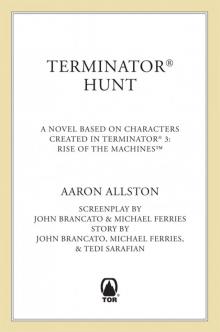 Terminator 3--Terminator Hunt
Terminator 3--Terminator Hunt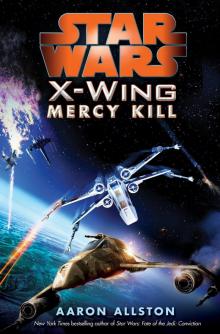 Mercy Kil
Mercy Kil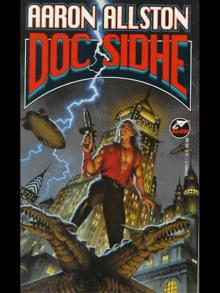 Doc Sidhe
Doc Sidhe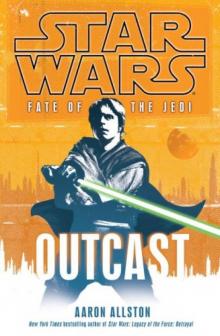 Star Wars: Fate of the Jedi: Outcast
Star Wars: Fate of the Jedi: Outcast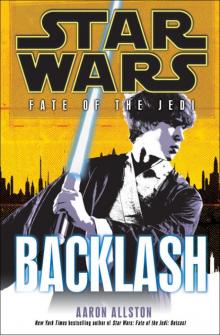 Fate of the Jedi: Backlash
Fate of the Jedi: Backlash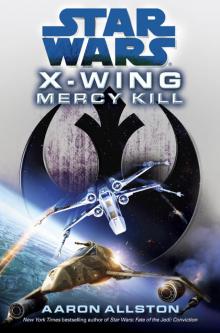 Mercy Kill
Mercy Kill Rebel Stand
Rebel Stand Wraith Squadron
Wraith Squadron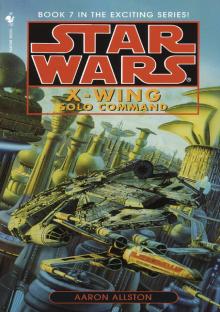 Star Wars: X-Wing VII: Solo Command
Star Wars: X-Wing VII: Solo Command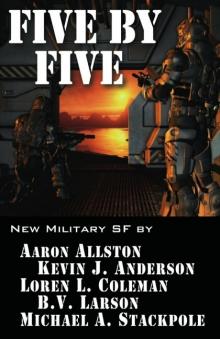 Five by Five
Five by Five Solo Command
Solo Command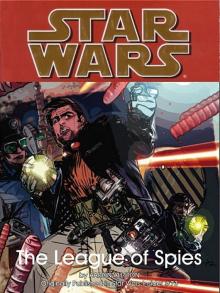 Star Wars: The Clone Wars Short Stories: The League of Spies
Star Wars: The Clone Wars Short Stories: The League of Spies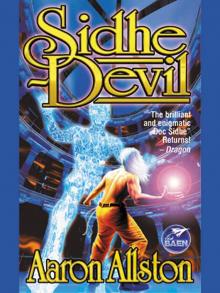 Sidhe-Devil
Sidhe-Devil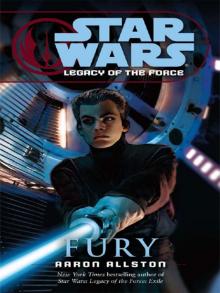 Star Wars: Legacy of the Force: Fury
Star Wars: Legacy of the Force: Fury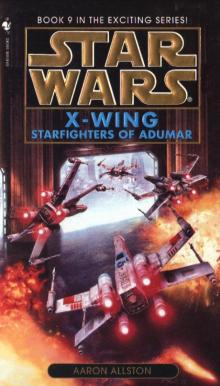 Starfighters of Adumar
Starfighters of Adumar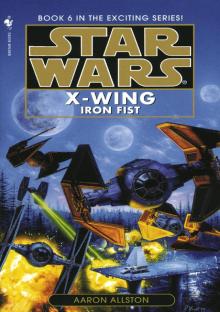 Star Wars: X-Wing VI: Iron Fist
Star Wars: X-Wing VI: Iron Fist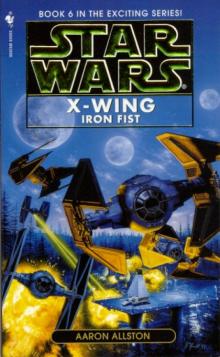 Star Wars - X-Wing - Iron Fist
Star Wars - X-Wing - Iron Fist Exile
Exile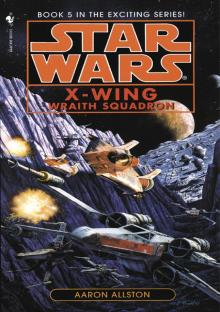 Star Wars: X-Wing V: Wraith Squadron
Star Wars: X-Wing V: Wraith Squadron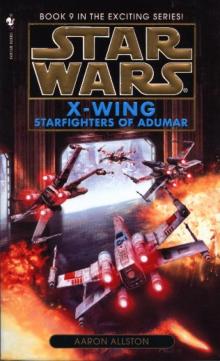 Star Wars - X-Wing - Starfighters of Adumar
Star Wars - X-Wing - Starfighters of Adumar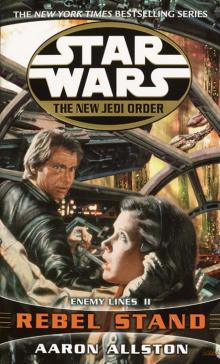 Rebel Stand: Enemy Lines II
Rebel Stand: Enemy Lines II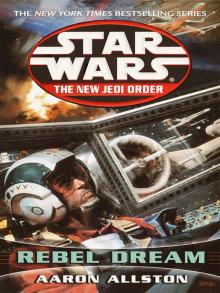 Rebel Dream: Enemy Lines I
Rebel Dream: Enemy Lines I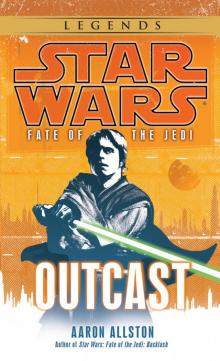 Outcast
Outcast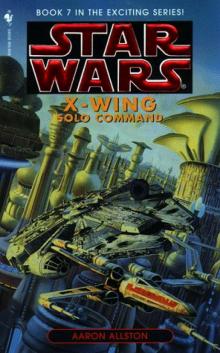 Star Wars - X-Wing 07 - Solo Command
Star Wars - X-Wing 07 - Solo Command